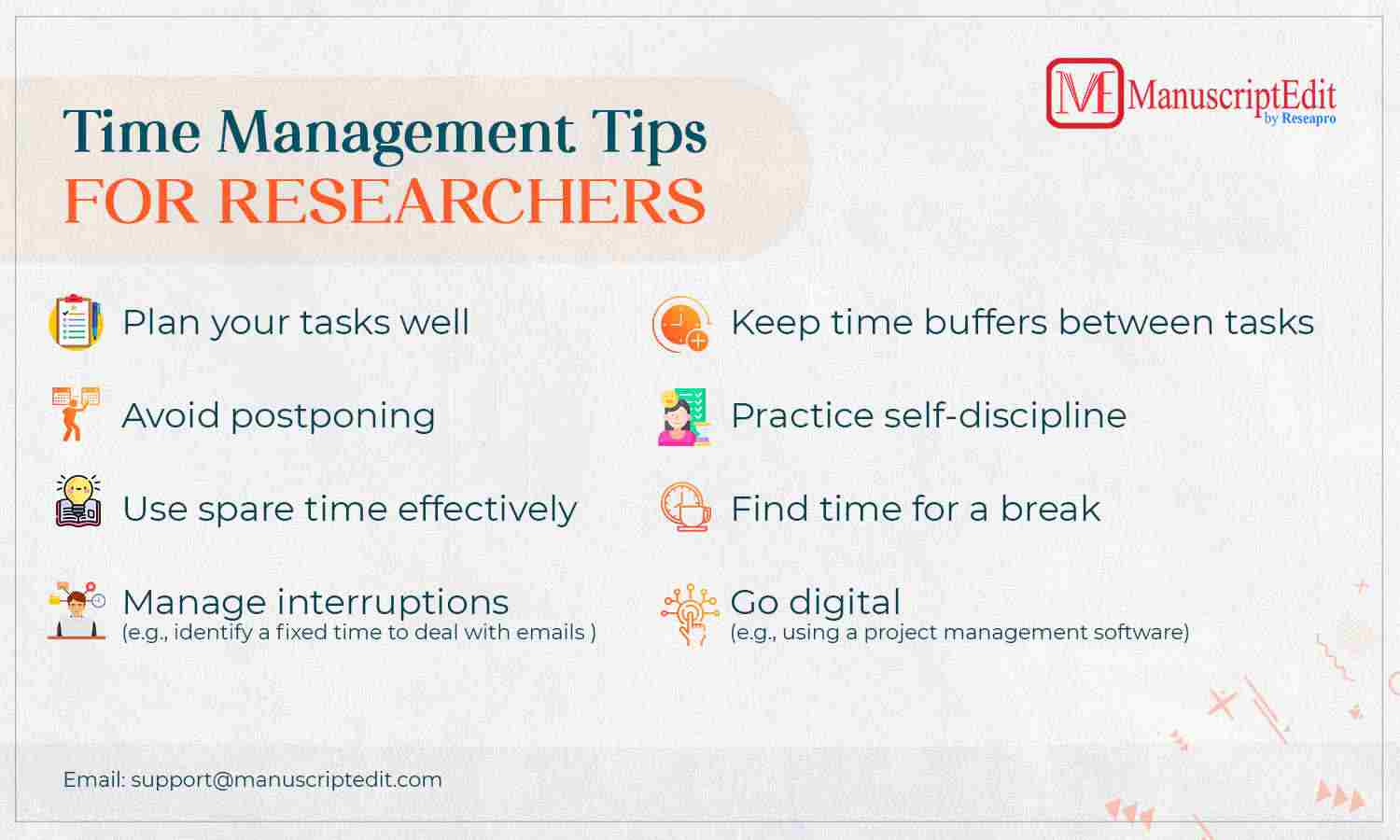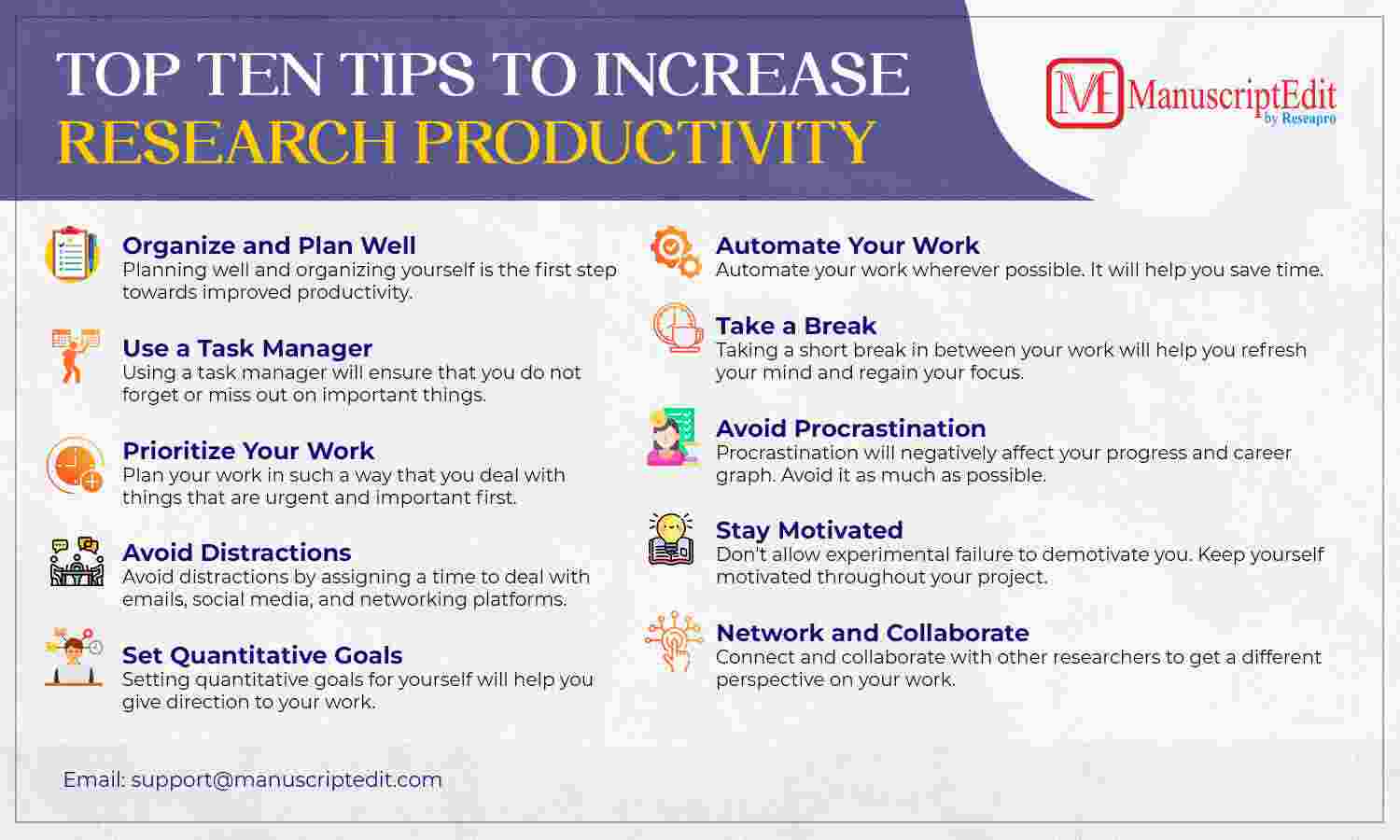 Academic researchers must be adept at managing their time to handle several projects, be productive, and fulfil deadlines. Effective time management techniques are essential because researchers must prioritize tasks, maintain focus, and accomplish their study goals despite obstacles, including heavy workloads, close deadlines, and distractions.
Academic researchers must be adept at managing their time to handle several projects, be productive, and fulfil deadlines. Effective time management techniques are essential because researchers must prioritize tasks, maintain focus, and accomplish their study goals despite obstacles, including heavy workloads, close deadlines, and distractions.
What is academic productivity in research?
Academic productivity is the efficient and successful creation of high-quality research outputs, such as papers, presentations, and grants. Accomplishing research objectives and enhancing academic careers entails managing time, resources, and energy. Maximizing productivity in academic research is essential because it results in higher output, a better work-life balance, and less stress.
Productive researchers can publish more, get financing, establish a solid reputation, and advance their careers. Additionally, work productivity research enables researchers to have a positive influence, feel fulfilled and accomplished, and make valuable contributions to their profession.
For instance, how to improve physician productivity, Implementing effective procedures, assigning responsibilities, and using technology—such as EHRs and AI-powered tools—will increase physician productivity. Reduce paperwork, streamline administrative processes, and cut down on disruptions.

How to increase research productivity?
The strategies for boosting productivity are as follows:
- Concentrating efforts, managing time well, and setting obvious priorities and goals are also important.
- Establish a timetable and follow it to guarantee steady progress and reduce procrastination.
- Minimize distractions and interruptions, such as social media, email notifications, meetings and other non-essential tasks
- .Leverage research tools and resources, including reference management software, productivity apps, time management tools, collaboration software
- Collaborate with others and delegate tasks to share the workload, bring new perspectives and develop new skills.
- Take regular breaks and practice self-care to prevent burnout, maintain energy and motivation and improve overall well-being.
How do you maximize maximize productivity?
Use applications and tools like reference and project management software to organize work and increase efficiency as a researcher. Use the “Pomodoro timer” strategy, focusing on 25-minute work intervals and taking 5-minute breaks in between.
Make your health and well-being a priority if you want to stay motivated and energetic. Maintaining organisation and time management skills through goal-setting, task prioritisation, and avoiding procrastination will help you accomplish your research objectives quickly and effectively.

How can a student maximize maximize their productivity?
Maximizing productivity as a student involves a multifaceted approach that encompasses effective time management, organization, and self-care practices. One of the most fundamental steps towards enhancing productivity is to create a well-structured study schedule and adhere to it diligently. This involves allocating specific time slots for different tasks, including studying, assignments, and recreational activities. By following a consistent schedule, students can optimize their time and ensure that they cover all necessary material in a timely manner.
In addition to a study schedule, leveraging productivity tools and applications can significantly aid in organization and task management. These tools can help students keep track of deadlines, manage their workload efficiently, and prioritize tasks based on their importance and urgency. Whether it’s a digital planner, task management app, or time-tracking tool, finding the right productivity resources can streamline academic responsibilities and alleviate stress.
Another key aspect of maximizing productivity is minimizing distractions, particularly those posed by email and social media notifications. Constant interruptions can disrupt focus and impede progress on tasks. By setting boundaries and limiting access to distracting platforms during study sessions, students can maintain concentration and productivity levels.
Moreover, preventing burnout is essential for sustaining long-term productivity. Taking regular breaks, practicing relaxation techniques, and engaging in activities that promote mental and physical well-being are crucial aspects of self-care. By prioritizing self-care practices, students can replenish their energy levels, reduce stress, and maintain motivation and productivity in the long run.
Conclusion
In summary, efficient time management is essential for academic research to boost output, fulfil deadlines, and accomplish research objectives. Researchers can enhance their production by applying techniques like goal-setting, scheduling, distraction reduction, and tool and resource utilization and make noteworthy advancements in their domain.
To increase the productivity and success of your research, put these strategies into practice right now!
References
- https://www.frontiersin.org/articles/10.3389/fevo.2022.1021812#:~:text=Academic%20productivity%20is%20often%20defined,Sarli%20and%20Carpenter%2C%202014).
- https://www.ncbi.nlm.nih.gov/pmc/articles/PMC4763375/



